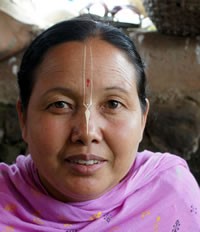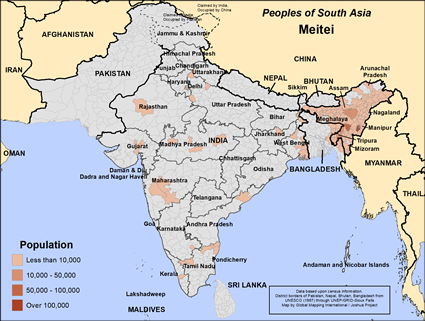Meitei in Bangladesh

Photo Source:
Copyrighted © 2026
Isudas All rights reserved. Used with permission |

Map Source:
People Group data: Omid. Map geography: UNESCO / GMI. Map Design: Joshua Project.
|
| People Name: | Meitei |
| Country: | Bangladesh |
| 10/40 Window: | Yes |
| Population: | 31,000 |
| World Population: | 2,035,000 |
| Primary Language: | Meitei |
| Primary Religion: | Hinduism |
| Christian Adherents: | 0.17 % |
| Evangelicals: | 0.00 % |
| Scripture: | Complete Bible |
| Ministry Resources: | Yes |
| Jesus Film: | Yes |
| Audio Recordings: | Yes |
| People Cluster: | South Asia Hindu - other |
| Affinity Bloc: | South Asian Peoples |
| Progress Level: |
|
Introduction / History
Although most of the world's Manipuri live in northeastern India, a large group also reside in neighboring Bangladesh. Also known as the Meithei, the Manipuri are of Mongolian descent and speak a language called Meithei.
After being defeated by the Burmese in a series of battles in the eighteenth century, many fled their homeland in the northeastern kingdom of Manipur. A significant number settled in East Bengal, which was then ruled by the British. Each Bengal became East Pakistan in 1947, which became Bangladesh in 1971.
What Are Their Lives Like?
Most Meitei in Bangladesh live in the district of Sylhet. This district borders the Indian state of Meghalaya. Sylhet is famous for its scenic tea plantations and lush green tropical forests. In sharp contrast to the flat plains of most of Bangladesh, Sylhet is characterized by forested, rolling hills.
Most Meitei are farmers. Their primary crop is rice, but they grow a variety of other crops, including sugarcane, tobacco, oranges and pineapples. The Meitei eat fish, but in accordance with Hindu custom, they abstain from eating any meat except fish. They are very conscientious of personal hygiene; consequently, they build their villages near rivers so that they may frequently wash their clothing and bathe.
In rural areas, to protect their homes from flooding, the Meitei build their houses on wooden bamboo poles. The houses have reed walls plastered with mud, and the roofs are made of thatch or tin. The villagers are divided into several clans (extended family units).
People are not permitted to marry within their own clan but must find a spouse from another clan. The Meitei have only one social class, which corresponds to the Indian caste that is at the bottom. These people have no prestige and are dominated by higher classes.
For recreation, the Meitei enjoy polo, boat racing, drama and dancing. They are famous throughout the world for their beautiful expressive dances. The dances are actually dramas interpreted by a narrator who chants dialogue and gives descriptions of the action. Themes are generally taken from the life of the god Krishna. In Bangladesh the Meiteis celebrate the Lai Haraoba and Ningol Chakouba festivals.
What Are Their Beliefs?
The Meitei were converted to Hinduism in the sixteenth century, but elements of their pre-Hindu religion remain today. In addition to worshiping the officially recognized Hindu gods, Meitei continue to worship many gods of nature, especially one who supposedly came to earth in the form of a snake. They have shrines for some of these deities. Folk beliefs continue to be highly influential in Meitei society. For example, the people often make difficult decisions by observing the positions of roosters' feet. They even have an old proverb that says, "All wisdom derives from a rooster's foot." Dance is closely tied to their religion. In the people's eyes, dance is a means of pleasing the gods and is the essence of the universe.
What Are Their Needs?
Although they are somewhat dissatisfied with Hinduism, the Meitei have been resistant when presented with the gospel. Those in Bangladesh have few opportunities to hear the gospel unless they go to one of India's highly reached northeastern states. The Bible is available in their language, as well as Christian radio broadcasts and the JESUS Film.
Prayer Points
Ask the Lord of the harvest to send Christian laborers to live and work among the Meitei community in Bangladesh.
Pray for the JESUS Film to become widely available in Meitei villages in Bangladesh.
Pray that God will give the Meitei believers boldness to share the love of Christ with those in Bangladesh.
Pray for the Meitei people to have the spiritual hunger it takes to seek and find the living Lord.
Ask the Lord to bring forth a vigorous Meitei church that will plant many more churches.